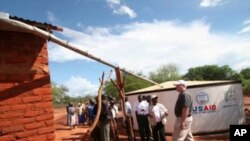A prominent member of Sudan’s ruling National Congress Party (NCP) said President Omar Hassan al-Bashir’s government has the sovereign right to grant, or deny, entry visas to individuals or organizations into the country.
Rabie Abdelati Obeid told VOA the government will not bow to external pressure to grant visas to “people” whose work, he said, does not benefit the country.
“This (is) actually practiced everywhere in the world, even if you want to go to the United States of America; they can give you a visa or they can say, ‘No, we are not giving the visa without giving reasons.’ I can say that this is the right of the government to do (grant visas), especially if that government respects its sovereignty and (is) not dominated or affected by any external factors, like our government,” said Obeid.
“We are the people to decide to say, ‘Yes,’ when we want to say according to our benefit and to say, ‘No,’ if we think that something will harm us or even as a precaution, we can say, ‘No.’”
His comments came after Navi Pillay, the U.N. High Commissioner for Human Rights, said Sudan is blocking aid workers from entering the country ahead of next month’s referendum.
Pillay described the move as a deliberate hold up by the government on granting entry visas into Sudan.
But, Obeid said several groups come to Sudan under the guise of humanitarian organizations, but often end up, in his words, “spying on the government.”
“Our government sometime (ago) expelled more than 13 non-governmental organizations coming to Sudan under the umbrella of providing aid to the people. But, unfortunately, we have discovered that such organizations, coming from abroad, don’t provide aid to the people,” said Obeid.
“Usually, for the non-governmental organizations especially, (those) coming from the U.S.A. and Europe, they come under the umbrella of humanitarian assistance. But, they come here and do other political work, spy, (and) collect information from Sudan to serve the agenda of the Europeans and foreign countries to implement their agenda against our people.”
Meanwhile, a top Sudanese official says the country will almost certainly split in two as a result of the south's referendum on independence next month.
The state-run SUNA news agency quoted Nafie Ali Nafie, an aide to President Omar al-Bashir, who made the prediction during a speech to farmers and herdsmen Thursday.
Nafie said the government in Khartoum continues to push for unity. But, he said it is now "expected" that the oil-producing south will separate from the north following the 9th January referendum.
He added that government officials shall accept the reality and must not deceive themselves.
Tensions between the south and Sudan's central government have been rising ahead of the vote, as disputes about oil revenue and other issues remain unresolved.
Nafie tried to allay fears about southern Sudan's withdrawal saying the north can succeed economically through agriculture and mining.











